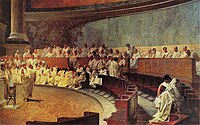
Photo from wikipedia
Using an October 2013 national probability sample of US adults (N = 1737), we examine the credibility of informal communicators (e.g. neighbors, co-workers, religious leaders, and health professionals) on solutions to climate… Click to show full abstract
Using an October 2013 national probability sample of US adults (N = 1737), we examine the credibility of informal communicators (e.g. neighbors, co-workers, religious leaders, and health professionals) on solutions to climate change (regulatory and technological solutions). We present our analysis in terms of Kruglanski et al.’s [(2005). Says who? Epistemic authority effects in social judgment. Advances in Experimental Social Psychology, 37, 345–392] epistemic authority framework, which explains dynamics of trust in formal sources of authority with specific expertise (e.g. climate scientists) and informal sources of authority in a person's life (e.g. a priest). Trust in formal communicators (scientists and President Obama) consistently predicts trust in informal communicators (e.g. health professionals), and perceived effectiveness of climate solutions. Results further show that social and demographic groups that do not primarily rely on formal communicators on solutions to climate change instead rely more on various informal communicators. For example, political conservatism positively predicts trust in religious leaders, and religiosity further predicts trust in congregants, neighbors, co-workers, bosses and health professionals on solutions to climate change. Discussion focuses on implications for future research, and recommendations for policy actors, environmental communicators, and social marketers interested in broadening the scope of climate outreach.
Journal Title: Environmental Communication
Year Published: 2017
Link to full text (if available)
Share on Social Media: Sign Up to like & get
recommendations!